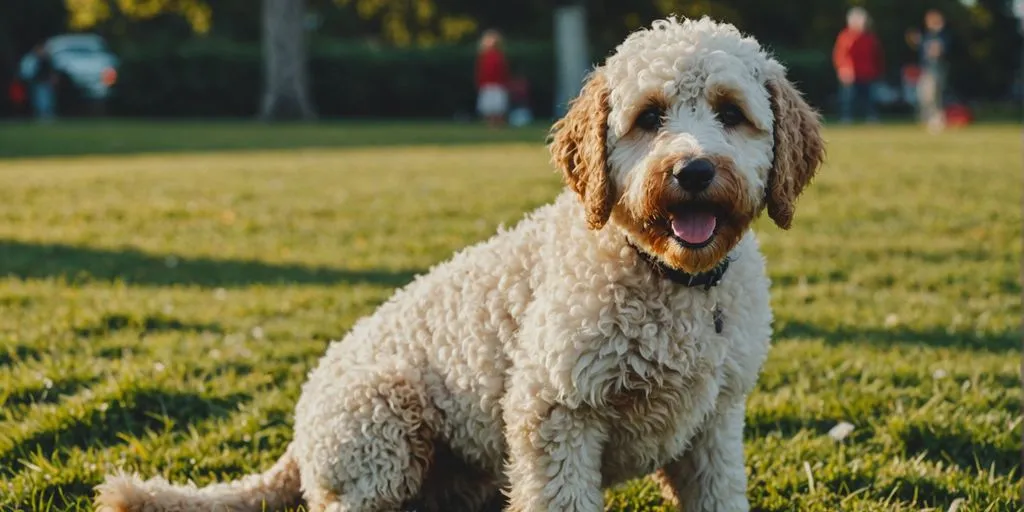Do Pyredoodles Shed? These dogs are known for their big size and gentle nature, earning them the nickname “gentle giants.” They have thick, curly coats that do not shed much and are great for people with allergies.
Pyredoodles are smart and easy to train, making them perfect for families. They are loving and loyal but can be cautious around strangers and other dogs.
- Key Takeaways
- Characteristics of the Pyredoodle Coat
- Hypoallergenic Qualities
- Grooming Needs
- Shedding Patterns
- Factors Influencing Shedding
- Managing Shedding
- Brushing Techniques
- Bathing Frequency
- Professional Grooming
- Training and Socialization
- Exercise Requirements
- Family Compatibility
- Common Health Issues
- Diet and Nutrition
- Regular Vet Check-ups
- Affection and Loyalty
- Interaction with Other Pets
- Guarding Instincts
Key Takeaways
- Pyredoodles are a hybrid of the Great Pyrenees and Poodle, known for their gentle and loving nature.
- They have thick, curly coats that are hypoallergenic and shed very little, making them suitable for people with allergies.
- These dogs are highly intelligent and easy to train, excelling in obedience and agility tasks.
- While affectionate with their families, Pyredoodles may be cautious around strangers and other pets.
- Regular grooming is essential to keep their coats healthy and to manage any shedding.
Understanding the Pyredoodle Coat
Characteristics of the Pyredoodle Coat
Pyredoodles, a mix of Great Pyrenees and Poodles can have a variety of coat types. Some have a thick, curly, or wavy coat that feels like fleece.
Others might have a short, dense single coat. The coat colors can range from gray, white, apricot, and cream to black. Sometimes, they have solid colors, and other times, a mix.
Hypoallergenic Qualities
One of the best things about Pyredoodles is that they can be hypoallergenic. It means they are less likely to cause allergies. However, this depends on the type of coat they inherit.
If they have a coat that is more like that of a poodle, they are more likely to be hypoallergenic.
Grooming Needs
Grooming a Pyredoodle can be different for each dog. If your Pyredoodle has a long, thick double coat, you might need to brush it daily. If they have a shorter, denser coat, brushing twice a week might be enough.
Regular grooming helps keep their coat healthy and reduces shedding. Do not forget to check their ears weekly to avoid infections.
Do Pyredoodles Shed?
Shedding Patterns
Yes, Pyredoodles do shed. While some Pyredoodles may be low-shedding dogs, most will shed at least a little, and many will be moderate to heavy shedders.
The Great Pyrenees parent has a thick, heavy double coat and drops a large amount of fur once or twice a year as the seasons change. Even low-shedding Pyredoodles will need regular brushing.
Factors Influencing Shedding
The Pyredoodle’s coat can vary dramatically depending on which breed he leans towards. From a long, thick double coat to a short, dense single coat, it all depends on which side of the gene pool your pup comes from.
As a result, grooming can range from necessary daily brushing to just twice weekly if he has a lower-shedding poodle coat. Either way, this dog is a low- to moderate-shedder who may (or may not) have a hypoallergenic coat.
Managing Shedding
Regular grooming is key to managing shedding. Even low-shedding Pyredoodles will need to be brushed regularly and should be taken to the groomer every 6–10 weeks. Because Pyredoodles are part livestock guardian dogs, they may not enjoy being handled by strangers.
Finding your Pyredoodle a groomer ASAP is a good idea. Due to their size, they can be a bit of a handful during grooming sessions, so starting early sessions can help them get used to the process.
Regular grooming and brushing are essential to keep your Pyredoodle’s coat healthy and to manage shedding effectively.
Grooming Tips for Pyredoodles
Brushing Techniques
Pyredoodles have a dense, curly coat that needs regular brushing to stay neat and healthy. I usually brush my doodle a few times a week to prevent any matting.
If your Pyredoodle has a thicker coat, you might need to brush more often. A slicker brush or pin brush works great for this.
Bathing Frequency
Bathing your Pyredoodle every 4-6 weeks is a good rule of thumb. Bathing helps keep their coat clean and free of tangles. If they get extra dirty, you might need to bathe them more often. Just make sure to use a dog-friendly shampoo.
Professional Grooming
While you can handle most grooming at home, taking your Pyredoodle to a professional groomer every couple of months can be really helpful.
They can give your gentle giant a trim and check for any skin issues. Plus, it is a nice treat for your pup!
Regular grooming sessions are a great way to bond with your Pyredoodle and keep them looking their best.
Living with a Pyredoodle
Living with a Pyredoodle is a unique experience. These dogs are a mix of the Great Pyrenees and the Standard Poodle, making them both intelligent and loyal.
They are known for their friendly nature and make excellent family dogs. However, there are a few things you should know to ensure a happy life together.
Training and Socialization
Training a Pyredoodle can be a rewarding experience. They are intelligent dogs, thanks to their Poodle parent, and they pick up commands quickly.
Early socialization is crucial. It is important to introduce your Pyredoodle to other pets and people while they are still a puppy. It helps them become well-rounded adults. Remember, a well-socialized Pyredoodle is less likely to develop behavioral issues.
Exercise Requirements
Pyredoodles have moderate to high exercise needs. They enjoy activities like walks, playtime, and mental challenges. A trip to the dog park can be a great way to burn off some energy.
Regular exercise is essential to keep them healthy and happy. Without enough activity, your Pyredoodle may become bored and develop unwanted behaviors.
Family Compatibility
Pyredoodles are known for their loyalty and protectiveness, much like their Great Pyrenees parent. They are great with kids and can get along well with other pets. However, it is important to introduce your Pyredoodle to other animals slowly and calmly.
They can adapt to various living environments, whether it is an apartment or a house, as long as they get enough exercise and mental stimulation. Overall, they make a wonderful addition to any family.
Health and Wellness of Pyredoodles
Common Health Issues
Pyredoodles, like all breeds, can face certain health problems. They inherit some conditions from their Great Pyrenees parent and Poodle lineage.
Common issues include hip dysplasia, bloat, and certain cancers. It’s crucial to get your Pyredoodle from a reputable breeder who screens for these genetic conditions.
Diet and Nutrition
Keeping your Pyredoodle at a healthy weight is vital. A balanced diet and regular exercise help prevent joint issues and other health problems. Make sure your dog gets at least one good half-hour to hour-long walk each day, along with some interactive play.
Regular Vet Check-ups
Routine vet visits are essential. Regular check-ups help catch any health concerns early. Your vet can help you develop a care routine to keep your dog healthy. Regular grooming, exercise, and vet check-ups are key to a long, happy life for your Pyredoodle.
With proper care and attention, Pyredoodles can live long and healthy lives, bringing joy and companionship to their families for many years to come.
Pyredoodle Temperament and Behavior
Affection and Loyalty
The pyre doodle is a loyal family dog that loves to be around its people. They form strong bonds with their owners and are especially gentle with children.
These bonds make them ideal family companions. Their affectionate nature means they enjoy being the center of attention and are always ready for a cuddle.
Pyredoodles love being part of the family and thrive on human interaction.
Interaction with Other Pets
Pyredoodles are generally good with other pets, especially if they are socialized early. Their gentle and calm demeanor makes them great companions for smaller animals.
However, it is important to supervise interactions with smaller pets initially to ensure everyone gets along.
Guarding Instincts
Despite their sweet nature, pyre doodles have a protective side. They are natural guardians and can be quite wary of strangers. It makes them excellent watchdogs.
While they are not aggressive, they will alert you if they sense danger. Their bark is often enough to deter any potential threats.
A pyre doodle may be calm indoors, but they are always on the lookout for anything unusual.
The pyre doodle breed is known for its balanced temperament, making it a great choice for families and individuals alike. Whether you are looking for a loving companion or a reliable watchdog, the pyre doodle is a mix that offers the best of both worlds.
Choosing a Pyredoodle
When looking for a Pyredoodle, it is super important to choose a reputable breeder. It ensures that your new furry friend is healthy and well-socialized. A good breeder will provide health clearances for both parent breeds, the Great Pyrenees and the Standard Poodle.
They should also allow you to meet the puppies’ parents and see where the puppies are raised. Avoid breeders who can’t provide these assurances or who have multiple litters available at once.
Adopting a Pyredoodle can be a wonderful option. Many mixed-breed dogs, including Pyredoodles, end up in shelters and rescues. When adopting, ask about the dog’s history, temperament, and any health issues.
Be prepared for a period of adjustment as your new pet gets used to their new home. Adoption is a great way to give a dog a second chance at a happy life.
Before bringing your Pyredoodle home, make sure your space is ready. Pyredoodles are a large breed, so they need plenty of room to move around. Puppy-proof your home by removing any dangerous items and setting up a safe space for your new pet.
Stock up on essentials like food, water bowls, toys, and a comfy bed. Remember, Pyredoodles require regular exercise, so having a yard or nearby park is a big plus.
Getting a Pyredoodle is a big commitment, but with the right preparation, you will have a loyal and loving companion for years to come.
Conclusion
In summary, Pyredoodles is a wonderful blend of the Great Pyrenees and the Poodle, bringing together the best traits of both breeds. These gentle giants are not only intelligent and easy to train but also affectionate and loyal to their families.
While they may shed a little, their hypoallergenic coats make them a great choice for people with allergies. If you are looking for a large, loving, and elegant companion, the Pyredoodle might just be the perfect dog for you.
Remember, adopting from a rescue group is always a great option to give these amazing dogs a loving home.
Frequently Asked Questions
What exactly is a Pyredoodle?
A Pyredoodle is a mix of Great Pyrenees and Standard Poodles. They are known for being smart, loving, and having low-shedding coats.
Does Pyredoodles shed a lot?
Some Pyredoodles shed a little, while others shed more. It depends on their coat type. They usually need regular brushing and grooming.
Are Pyredoodles good for people with allergies?
Yes, Pyredoodles are often good for people with allergies because they have hypoallergenic coats that shed less.
How big do Pyredoodles get?
Pyredoodles are large dogs. They can grow to be 22-32 inches tall and weigh between 85-100 pounds.
Are Pyredoodles easy to train?
Yes, Pyredoodles are very smart and usually easy to train. They do well in obedience and agility activities.
Do Pyredoodles get along with kids and other pets?
Yes, Pyredoodles are friendly and loyal. They usually get along well with children and other animals.










